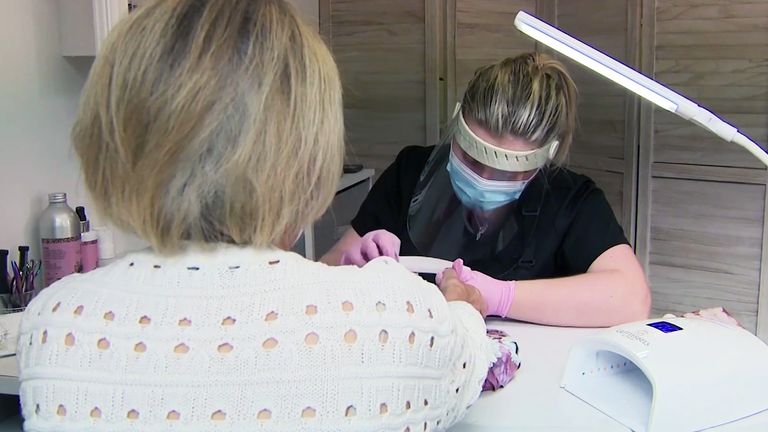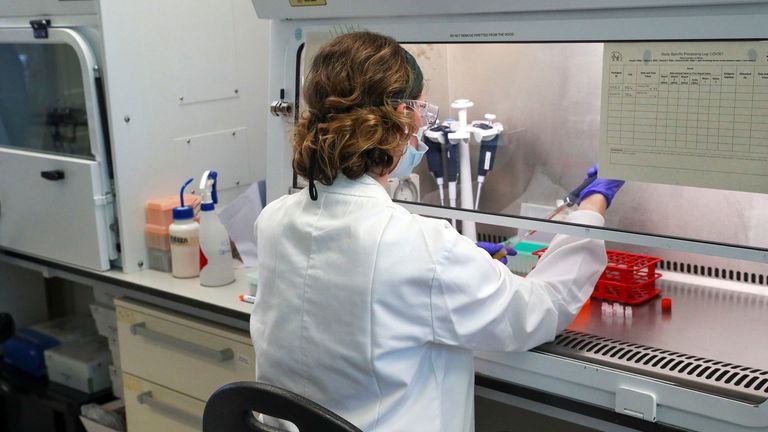NHS England’s coronavirus contact-tracing app could be revamped with new features designed to bring “personal benefits” to users, Sky News can reveal.
The proposed features include “Fitbit-style” alerts letting people know whether they might have been at risk of catching coronavirus, and “check-ins” with QR codes at the entrances of businesses, according to a person involved with the project.
Officials at NHS England’s innovation unit, NHSX, believe this will help win over a sceptical public and revitalise the troubled project after a series of high-profile delays and development issues.
But one of the proposed features could bring the UK government into further conflict with Apple after it emerged that the tech company had refused a request by another government to add QR check-ins to its app.
The Westminster government ditched its homegrown contact-tracing system last month in favour of a toolkit developed by Apple and Google. Health Secretary Matt Hancock blamed Apple for the app’s failure, citing the difficulty created by the privacy-protecting restrictions it placed on apps that use Bluetooth to measure proximity.
Although Test and Trace head Baroness Dido Harding has described the app as “the cherry on the cake” and refused to give a timeline for the project, people involved with it say the new app is still intended to be released this year.
In discussions about their plans ahead of a roll-out, the team working on the app has stressed the need to identify personal benefits for users in order to encourage large-scale engagement.
From an epidemiological perspective, the purpose of the contact-tracing app is to quarantine anyone infected with coronavirus as quickly as possible in order to stop them infecting other people.
But in an video conference presentation last week, staff from NHSX said they are looking to appeal to self-interest rather than altruism, described as “an appeal to ‘me’ rather than ‘we'”, according to one person who attended.
One idea under consideration is a “check-in” system, which would let people scan QR codes at the entrances to businesses. The data from this activity would be voluntarily sent to NHSX, which could then alert people if there had been an outbreak around the workplace.
“We noticed you checked into Pret the other day. There’s been an outbreak, please stay inside for a couple of weeks,” was how a person briefed on the concept described the proposed alerts.
This idea may lead to a clash with Apple, according to a senior official at a country with an app, who says his government was told it could not include a similar system in an app that used the Google and Apple contact-tracing toolkit.
“You can’t use safe-entry QR codes to drive adoption,” the source said. “Apple and Google say that encodes some notion of location and is therefore not allowed.”
Apple and Google’s rules state they will prevent any contact-tracing app using their toolkit from accessing location data, but it has not been clear that they might include check-in codes – which could reveal the location of the user at the moment they scan it – under this definition.
The senior official said the key objection came from Apple, which is based in Cupertino, California.
“I understood GPS to be out of the question,” they told Sky News. “Cupertino legal also equivocated and thought a check-in system was ‘precise location.'”
Apple did not respond to a request for comment, but in recent weeks government sources have stressed the closeness of the relationship after what one Department of Health source described as the “surface noise” around Mr Hancock’s announcement in June.
The source said: “We’ve got a really good collaborative process going on, and it feels like both sides are making good progress on developing the app.”
Another feature being considered by NHSX is an equivalent of the step count notifications sent out by exercise devices such as Fitbits, which would remind people that the app is working and nudge them into safer behaviours.
The alerts would be based on several factors, including the amount of people a user has been in contact with and the R number in their local area, but would not be used to tell someone to go into quarantine.
Although there have been rumours that NHS England might release an app without Bluetooth-powered contact tracing, this would still be the app’s central function, according to a person with direct knowledge of the matter.
Features which entice users to engage more frequently are a common part of traditional app development, but a more individual tactic could contradict the approach suggested by behavioural scientists advising the government, who have called on it to create a “sense of collectivism” to encourage adherence to guidelines.
Despite having been among the first countries to start development of a contact-tracing app, England now lags behind most of its European neighbours. The Republic of Ireland’s app was released three weeks ago. The Northern Irish government has said its app will be launched in July.
Asked about the proposed features that could form part of the English contact-tracing app, a Department of Health spokesperson said: “We don’t comment on speculation.”


